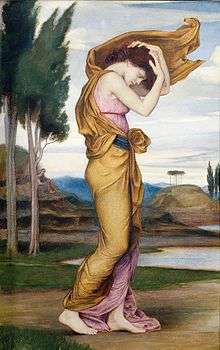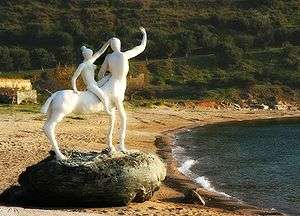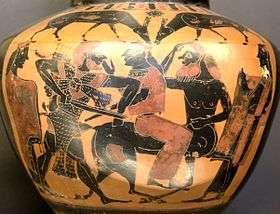Deianira
Deianira, Deïanira, or Deianeira[1] (/ˌdeɪ.əˈnaɪərə/;[2] Greek: Δηϊάνειρα, Dēiáneira, or Δῃάνειρα, Dēáneira, [dɛːiáneːra]), also known as Dejanira,[3] is a figure in Greek mythology whose name translates as "man-destroyer"[4] or "destroyer of her husband".[5] The name Deianira refers to two separate characters in Greek mythology.
The better-known Deianira was a wife of Heracles and, in late Classical accounts, his unwitting murderer, killing him with the poisoned Shirt of Nessus. She is the main character in Sophocles' play Women of Trachis. The less well-known Deianira was an Amazon, killed by Heracles during his quest for the girdle of Hippolyta.[6]
Marriage

Deianira was the daughter of Althaea and her husband Oeneus[7] (whose name means "wine-man"), the king of Calydon (after the wine-god gave the king the vine to cultivate), and the half-sister of Meleager. She also was said to have become the mother of Macaria (who saved the Athenians from defeat by Eurystheus).
In Sophocles' account of Deianira's marriage, she was courted by the river god Achelous but saved from having to marry him by Heracles, who defeated Achelous in a wrestling contest for her hand in marriage.[8] In another version of her tale, Deianira is instead the daughter of Dexamenus, king of Olenus. Heracles rapes her and promises to come back and marry her. While he is away, the centaur Eurytion appears, demanding her as his wife. Her father, being afraid, agrees. Heracles returns before the marriage and slays the centaur, claiming his bride.[9]
Deianira was associated with combat, and is described as someone who "drove a chariot and practiced the art of war."[10] Robert Graves interpreted the association with war as a relationship with the pre-Olympian war goddess, Athene, who was an orgiastic bride in many local sacred marriages to kings who may have been sacrificed.
Death of Heracles

The central story about Deianira concerns the Tunic of Nessus. A wild centaur named Nessus attempted to kidnap or rape Deianira as he was ferrying her across the river Euenos, but she was rescued by Heracles, who shot the centaur with a poisoned arrow. As he lay dying, Nessus persuaded Deianira to take a sample of his blood, telling her that a potion of it mixed with olive oil would ensure that Heracles would never again be unfaithful.
Deianira believed his words and kept a little of the potion by her. Heracles fathered illegitimate children all across Greece and then fell in love with Iole. When Deianira thus feared that her husband would leave her forever, she smeared some of the blood on Heracles' famous lionskin shirt. Heracles' servant, Lichas, brought him the shirt and he put it on. The centaur's toxic blood burned Heracles terribly, and eventually, he threw himself into a funeral pyre. In despair, Deianira committed suicide by hanging herself or with a sword.
References
Notes
- ↑
 Chisholm, Hugh, ed. (1911). "Hercules". Encyclopædia Britannica. 13 (11th ed.). Cambridge University Press. p. 346.
Chisholm, Hugh, ed. (1911). "Hercules". Encyclopædia Britannica. 13 (11th ed.). Cambridge University Press. p. 346. - ↑ Wells, John C. (2009). "Deianira". Longman Pronunciation Dictionary. London: Pearson Longman. ISBN 978-1-4058-8118-0.
- ↑
 Baynes, T.S., ed. (1878). "Dejanira". Encyclopædia Britannica. 7 (9th ed.). p. 37.
Baynes, T.S., ed. (1878). "Dejanira". Encyclopædia Britannica. 7 (9th ed.). p. 37. - ↑ P. Walcot, "Greek Attitudes towards Women: The Mythological Evidence" Rome, 2nd Series, 31:1:43 (April 1984); at JSTOR
- ↑ Koine. Y. (editor in chief), Kenkyusha's New English-Japanese Dictionary, 5th ed., Kenkyusha, 1980, p.551.
- ↑ Diodorus Siculus, Library of History, 4.16.3
- ↑ Hammond, N. G. L.; Scullard, H. H., eds. (1970). The Oxford Classical Dictionary (2d ed.). Oxford [Eng.]: Clarendon Press. p. 319. ISBN 0198691173.
- ↑ Wohl, Victoria (2010). "A Tragic Case of Poisoning: Intention Between Tragedy and the Law". Transactions of the American Philological Association. 140 (1): 53.
- ↑ Hyginus, Fabulae, 31
- ↑ Bibliotecha I.8.1
Primary sources
- Hesiod, Catalogue of Women fr. 25
- Ovid, Heroides 9
- Ovid, Metamorphoses 9.101-238
Secondary sources
- Harry Thurston Peck, Harper's Dictionary of Classical Antiquities, 1898
- Graves, Robert, The Greek Myths, 1955, 142.ff, 142.2,3,5
External links
 Media related to Deianira at Wikimedia Commons
Media related to Deianira at Wikimedia Commons
| Preceded by Omphale |
Wives of Heracles | Succeeded by Hebe |
